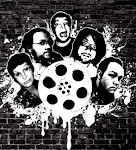GHOUL SCHOOL
Director: Timothy O'Rawe
Writer: Timothy O'Rawe
Starring: William Friedman, Scott Gordon, Joe Franklin
1990 | United States | Not Rated | 71 mins
★★½
In the world of low-budget filmmaking it really doesn't take much to make a horror film. All you need is a camera, some friends, a few buckets of blood and guts, and a basic idea. But talent? Pfffft, you can just throw that to the wind! Somehow a bad horror film doesn't always end up being bad. Especially when you have a bunch of friends over, and a couple of cold ones readily available, these train-wrecks end up being a whole lot of fun to behold. So grab your backpack and head back to Horror High with Ghoul School.
A couple of bumbling criminals break into the boiler room of a local high school and unexpectedly unleash a toxic chemical into the school's water supply. Soon the high school swim team are turned into undead ghouls after doing laps in the contaminated pool and start munching on the student population. Now it's up to Steve (William Friedman) and Jeff (Scott Gordon), a couple of horror movie loving nerds, as well as the members of a local heavy metal band to save the rest of the uneducated from the undead!
Not based off of the awesome old-school Nintendo game of the same name, Ghoul School is a low-budget schlock-fest filled with horrible dialogue, choppy editing, and a ridiculously nonsensical plot. If you're looking for entertaining camp you're in the right class. Featuring horribly incoherent and out of place cameos from both Joe Franklin and not very funny comedian Jackie the Joke Man, Ghoul School will have you scratching your head and laughing at its ineptness. Timothy O'Rawe has created a shot-on-16mm butt-number that features some hilarious gore gags (where when your limbs are torn off it's actually giant blood-filled condoms underneath your flesh, not veins and arteries like science would have you believe) and a ghoulish swim team that resemble dollar-store versions of the demons from Lamberto Bava's Demons.
Filled to the brim with horribly amateur acting, late-80's mullets, the worst 'air band' in history, and enough blood splattered gore, Ghoul School is just too bad to not have a good time while watching. Bad comedies are bad. Bad dramas are bad. But bad horror movies somehow always manage to entertain, no matter how deranged, loopy, or incompetent. At least most of the time... So Ghoul School deserves a diploma simply for that because it's that special kind of fun, even if it is just to hide the fact from the rest of the alumni that it really is doomed to never graduate Horror High.
All contents copyright 2010 Tyler Baptist










